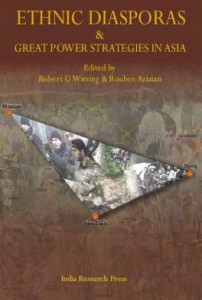Ethnic Diasporas & Great Power Strategies in Asia
Edited by Robert G. Wirsing and Rouben Azizian
Note: this publication is current not available for free download. Copies may be obtained through various online vendors.
Preface
A significant portion of the world’s population consists of ethnic diasporas. These are the dispersed, migrant, or (in some cases) “overseas” communities which, because they may claim a national homeland not currently the one in which they are domiciled, enjoy a status in the newer homeland distinct from other “indigenous” ethnic minorities. Varying in size, socio-economic standing, and also in the degree of surviving cultural identity and group cohesion, they differ enormously amongst themselves in terms both of the character and the importance of the roles they now occupy in their adopted homelands. They have been in the crosshairs of academic, journalistic, and policy maker inquiry for a long time, and in many countries, not just because they are large in number, but also because they have sometimes generated baffling, even tragic, problems of social and political integration. Widely, even if often erroneously, believed to harbor bifurcated cultural and political loyalties, they have at times been central elements in national and global controversy. In some lands, the loyalty issue has placed them under great suspicion – in a few cases also under grave threat of physical harm. The present era’s fascination with the terrorist threat, and with the potential for its spread around the world via disaffected diasporic communities, seems certain to keep this issue very much alive.
This volume’s focus on the strategic links between three Asian great powers (China, Russia, India) and their respective ethnic diasporas inevitably brings the matter of political loyalty to center stage. Russians worry, of course, about the political leanings of the ethnic Chinese settled in the Russian Far East; Indians naturally seek to build and maintain ties with their prosperous migrant co-ethnics in the United States, the United Kingdom, and elsewhere; and the many countries on China’s periphery in which ethnic Chinese have settled inescapably give thought, in this age of China’s momentous rise to global power, to the long-term loyalties of these settlers. Along with the matter of loyalty, however, the contributions to this volume enable us to examine in detail a whole range of issues that figure in the calculations of great power strategists when it comes to the ethnic diasporas – from disputes over the actual size of the diaspora communities to disputes over their cultural cohesion and political influence.
Underway for two years or so, this project has acquired many debts. The editors owe the largest thanks of all to the authors of the chapters that fill the book’s pages. It is to their seasoned professionalism, meticulous research, and sound judgment that the book owes most of its merit. To the Asia-Pacific Center for Security Studies (APCSS), which has been not only the editors’ employer but also the sponsor of the conference that provided the initial impetus for the book, the project owes both its origin and its evolution to publication. The editors want to express particular thanks to the Center’s Director, Lt Gen Edwin P. Smith, US Army (rtd), whose commitment to serious research – and commitment as well of generous funds to support it – played a significant role in bringing the book to completion in its final stages.
Unsung heroes in this venture, without whose professional skills and dogged perseverance the book might never have seen light of day, were Lt Commander Angela Torres, Chief Procurement Officer, APCSS; Dottie Kaneshiro, Administrative Support, APCSS; and Steven Cyncewicz, our New York-based copy-editor, whose keen eye and sound judgment saved all of us from the jaws of grammatical and syntactical error.
The editors express their deep gratitude, too, to Anuj Bahri Malhotra, CEO and Head of Academic Division, India Research Press and Tara Press, Publishers, for overseeing the putting of essential final touches to the project, and for maintaining extraordinary patience and good humor even when deadlines passed us by. For her kindness in putting us in touch with the IRP, we want to thank Binalakshmi Nepram, faithful friend and activist extraordinaire of New Delhi.
To our wives Irina and Nancy, of course, we owe not just the traditional benediction for their unswerving support of our professional labors, but also a loving caress for being the reason and the inspiration for it all.
Rouben Azizian and Robert Wirsing
Honolulu
October 2006








